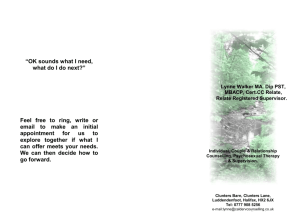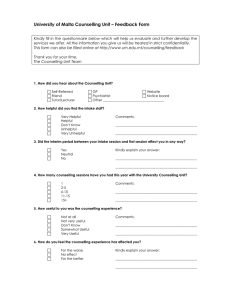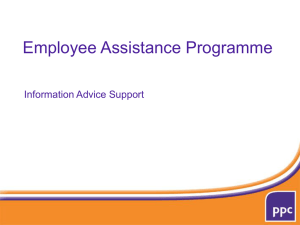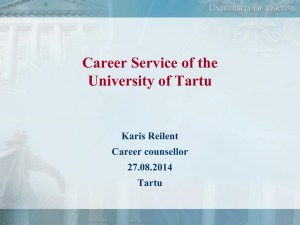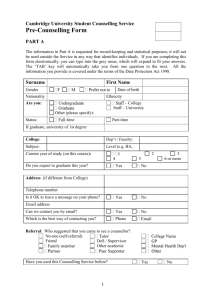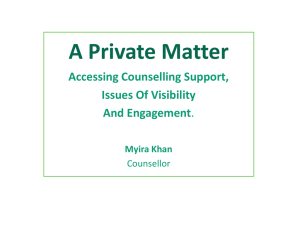The Use of Text Chat and Video to Effect Clinical Change
advertisement
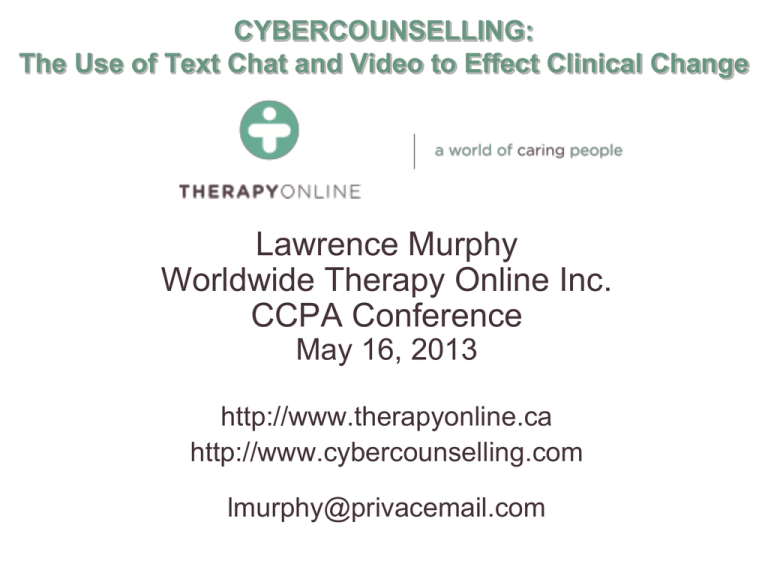
CYBERCOUNSELLING: The Use of Text Chat and Video to Effect Clinical Change Lawrence Murphy Worldwide Therapy Online Inc. CCPA Conference May 16, 2013 http://www.therapyonline.ca http://www.cybercounselling.com lmurphy@privacemail.com A Brief History of Therapy Online • • • • • • • 1994 - founded by Lawrence Murphy and Dan Mitchell 1998 - Co-authored the first online ethical code with the NBCC 1998 - Published seminal work “When Writing Helps to Heal” 2009 - Publication in BJSW compares F2F and online 2013 – COSCE assessment tool published in RSWP Developed secure encrypted e-mail, chat & video and client management system (wwto.PrivacEmail.com) Provide certificate Cybercounselling training in collaboration with the University of Toronto. Online Ethics • The USA PATRIOT Act • • • • allows federal agents to access routing information, pages visited, activities online allows investigation of email routing information does NOT require proof of wrongdoing Judge may NOT refuse. Online Ethics • Having an email address on your website • • Using email for booking appointments • • • Tracing clients in emergencies Who controls what the client says? Who is watching you? What will your insurance company say? It Just Crept In • • • • Mishna et. al (2012) Clin Soc Work J Clients tend to initiate more than social workers Slippery slope from administrative to “therapeutic” Privacy issues • • • • Intercepted email Sharing on Facebook or via twitter Boundaries become permeable A sense of inevitability. When is Online Counselling Indicated? • • The majority of face-to-face counselling issues are appropriate for online work People who are especially sensitive to the presence or judgment of others and who would not otherwise connect with mental health services are often very well served by eCounselling (Leibert et al., 2006). When is Online Counselling Indicated? • • • People with physical, psychological or mental challenges Marginalised and disenfranchised people Those for whom we claim to offer services • The right to treatment?. When is Online Counselling Contraindicated? • • • • Clients with mental health issues that involve a serious distortion in reality who are unmedicated Clients disclosing past sexual abuse for the first time (text only) Clients who are suicidal Risky for clients in a live-in relationship with ongoing violence. Theoretical and Practical Issues in Asynchronous Work • • • • • Anonymity Reply when you’re ready A Permanent Record (C) Power and Empowerment (c) Lack of Tone and Non-Verbals (C). Theoretical and Practical Issues in Chat • • • • Loss of contact (V) Live communication means higher expectations for software (V) Speed of replies • • How long is too long to be typing? Spelling and grammar Guiding clients. Theoretical and Practical Issues in Video • • • • High bandwidth demands Hardware and software must be very good Where do I look? You are entering the client’s home • • • What’s on the wall? Was that violence on TV or next door? When does what become a clinical issue?. Recent Research • • • Murphy et al, British Journal of Social Work (2009) Compared counselling clients engaged in either face to face or online counselling Difference in • • scores on Global Assessment of Functioning (0 to 100 pre and post clinical assessment) and Client Satisfaction Survey. CSS • • • My counsellor helped me feel comfortable in discussing my problems My counsellor’s efforts and suggestions helped me develop a plan for addressing my problems My counsellor had the skills and expertise to assist me with my concerns. Results • No statistically significant differences between the two groups for outcome • No statistically significant differences between the two groups in terms of client satisfaction. • • • Other Research Barak et. al (2008) Meta Analysis JTHS • Online interventions showed an overall effect size of 0.53, comparable to F2F King et. al (2009) Video in opioid addiction treatment JSAT • • Comparable levels of satisfaction and compliance Online clients indicated a preference for online work Moessner & Bower (2012) Email and eating disorders JMH • • • 57.3% first time accessing professional help half of these reported that they engaged in additional services most would have not done so without the online service. Conclusions from Research • The therapeutic alliance (TA) can be established in the media of online counselling •Online counselling can as impactful as face to face counselling • Online counselling may be an alternative or adjunct to face to face work.



